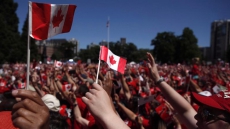VANCOUVER — A radical treatment that provides daily doses of alcohol to people struggling with problem drinking in several Canadian cities is getting attention from other countries wanting to emulate its success.
Bernie Pauly, a scientist at the Canadian Institute for Substance Use Research at the University of Victoria, is heading to Scotland in two weeks to speak about a study showing multiple benefits of managed alcohol programs.
A variety of about 20 programs are offered in cities including Vancouver, Toronto, Ottawa, Hamilton and Thunder Bay, Ont., with some providing shelter or housing to participants who get about a dozen drinks of wine or other alcohol daily, often through medical supervision.
Programs linked to housing offer people stability and safety from violence on the streets and are included in the ongoing study, Pauly said.
"We sometimes describe it as a made-in-Canada example as a response to those issues, and other countries are interested," she said, adding Australia has begun a feasibility study to determine if it can implement a managed alcohol program.
"We've had calls from places in Africa that are interested in what we're doing because worldwide alcohol use and related harms are responsible for some of the highest proportions of morbidity and mortality," said Pauly, who is also an associate professor of nursing at the university.

She and other researchers at the institute have written four papers featured in this month's special issue of the Drug and Alcohol Review as part of the Canadian Managed Alcohol Program Study.
Their findings, based on data from about 380 people, half of whom were in seven managed alcohol programs across the country, showed the participants had fewer hospital visits, detox episodes and police contacts leading to custody.
"Many of the communities that have started managed alcohol programs came from a very compassionate place and said, 'We need to start with harm reduction, we need to start with giving people a safer place to be and safer sources of alcohol to drink in safer amounts,' " Pauly said.
However, some programs in Canada have operated "under the radar" due to the controversial method of treating severe alcohol use disorder with alcohol, she said.
"For people who are in the managed alcohol programs, they have had many, many experiences with abstinence-based treatment that have not been effective. As a result they are often subject to harms related to binge drinking and explosive drinking patterns."
Public health specialist Dr. Tomislav Svoboda helped develop Canada's first managed alcohol program in Toronto about 20 years ago following a coroners inquiry into the freezing deaths of three men who couldn't get shelter at Seaton House because of their dependency on alcohol.
Svoboda still works at the facility, which has 50 to 70 shelter beds, and also at Art Manuel House in Etobicoke, Ont., where 10 housing beds are available, along with health care and social services.
"We have a bar and we dispense alcohol but really what's happening is that folks are drinking anyway and what we're doing is we're providing care, which has been refused for decades."
Research by Pauly and her colleagues provides the largest amount of data since two papers published in 2006 looked into Canada's managed alcohol programs, Svoboda said.
Bruce Hughes, one of his patients at Art Manuel House, hit rock bottom as a heavy drinker in the 1990s.
"I lost everything: my house, my wife, my kids. Anybody I did know didn't want anything to do with me."
Hughes said he was drinking mouthwash and up to 10 bottles of rubbing alcohol daily to get his fix before beginning treatment through the managed alcohol program about three years ago.
He received two bottles of wine every morning and was able to drink it through the day before getting six-ounce cups of wine every hour starting at 8 p.m.
"You get so many drinks a day depending on what the doctor orders. It's well managed. You don't see anybody drooling all over themselves or anything. And the good thing is you don't see people going outside and freezing to death."
Hughes said he hasn't had alcohol for six months but knows he's a "full-fledged drunk" who's one drink away from a setback.
"It alerted me to my addiction," he said of the program. "I was slowly starting to recognize this is my life: booze. I'm 52 years old and I got nothing."






